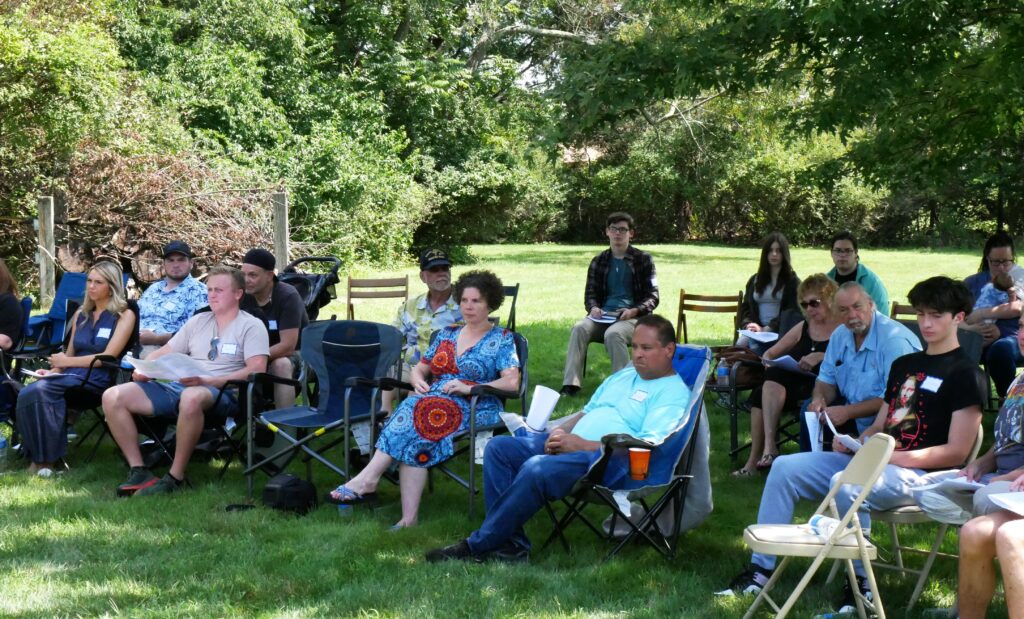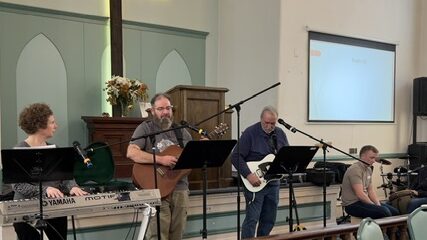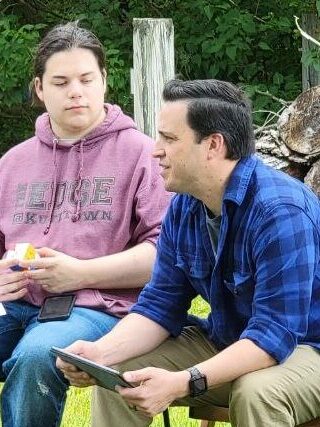What is a Microchurch?
Microchurches are small Christian communities that do not typically meet in traditional church settings. They are dedicated to following the example of the early church as expressed in the book of Acts.
They devoted themselves to the apostles’ teaching and to fellowship, to the breaking of bread and to prayer. Everyone was filled with awe at the many wonders and signs performed by the apostles. All the believers were together and had everything in common. They sold property and possessions to give to anyone who had need. Every day they continued to meet together in the temple courts. They broke bread in their homes and ate together with glad and sincere hearts, praising God and enjoying the favor of all the people. And the Lord added to their number daily those who were being saved. – Acts 2:42-47

Five Character Traits of a Microchurch
- Microchurches are Christ-centered worshiping communities
- Microchurches are Christ-centered intercessory communities
- Microchurches are Christ-centered transformational communities
- Microchurches are Christ-centered fellowshipping communities
- Microchurches are Christ-centered service-oriented communities
Microchurches are Christ-centered worshiping communities

What is worship? Is worship the music team that leads us in song on Sunday morning? Is worship teaching the truths of Scripture? Is worship prayer? Is worship the service provided to surrounding communities? The answer is all of the above!
Worship is the sum-total of our personal and corporate dedication and love for Christ, as expressed through our devotion to His Lordship, commands, teachings, and mission. Therefore a Christ-centered, worshiping community is one that incorporates all aspects of the life, values, and commands of Jesus Christ into the framework, structure, teachings, and corporate life of the microchurch.
This is what Scripture reveals in Act 2:42-47. The believers of Jesus Christ were engaged in all aspects of the life, values, and commands of Jesus Christ, and demonstrated worship of Christ through their actions commensurate with their commitment to His Lordship, commands, teachings, and mission. This biblical community worshiped in truth (biblical teaching), worshiped in praise and song, worshiped in fellowship, and worshiped in service to each other and surrounding communities; and this is exactly what a Christ-centered, worshiping, micro-church community should resemble like today.
Microchurches are Christ-centered intercessory communities
“They were continually devoting themselves to the apostles’ teaching and to fellowship, to the breaking of bread and to prayer.” – Act 2:42
Intercessory Communities are devoted to prayer; specifically identifying the needs of the community, each member of their microchurch, and ministries necessary to meet those needs. As Christians, we have a duty to pray and bring those requests before God. This is a great privilege and responsibility that has been bestowed upon the children of God, free access to the throne room of heaven where God’s listening ear is always ready to receive our prayers. The early church was dedicated to prayer, and they stand as a model for every microchurch to follow in their commitment to the spiritual care of their community.
Microchurches are Christ-centered transformational communities

“They were continually devoting themselves to the apostles’ teaching and to fellowship, to the breaking of bread and to prayer.” – Act 2:42
The Apostles did not preach anything other than the Gospel of Jesus Christ, and that we must become like Christ in our daily lives. In fact, Romans 8:29 reveals that we are all predestined to be conformed into the image of Christ as we faithfully walk in Him daily.
When reading the writings of the Apostles, one begins to understand that they taught three major themes:
- First, we must have a personal relationship with Christ.
- Second, we must look more and more like Christ as we progress in our relationship with Him.
- Third, we are conduits of His life that transforms the world around us. In other words, transformation occurs inward, and then transformation occurs outward as we serve Him.
Microchurches should be places of transformation, both inward and outward, as Christ is glorified in our growth.
Microchurches are Christ-centered fellowshiping communities
“They were continually devoting themselves to the apostles’ teaching and to fellowship, to the breaking of bread and to prayer. Everyone kept feeling a sense of awe; and many wonders and signs were taking place through the apostles. And all those who had believed were together and had all things in common; and they began selling their property and possessions and were sharing them with all, as anyone might have need. Day by day continuing with one mind in the temple, and breaking bread from house to house, they were taking their meals together with gladness and sincerity of heart.” – Act 2:42-46
The Bible states clearly that fellowship is a necessary part of Christian life. Hebrews Heb 10:23-25 states, “Let us hold fast the confession of our hope without wavering, for He who promised is faithful; and let us consider how to stimulate one another to love and good deeds, not forsaking our own assembling together, as is the habit of some, but encouraging one another; and all the more as you see the day drawing near.”
Fellowship is a key component in the life of any microchurch, not simply because of the biblical exhortation to fellowship, but for the important reason that Christian fellowship brings much needed edification, support, transformation, and strength to our lives.
Acts 2:42-46 reveals that the early church did not simply “hang out” with each other, but spurred each other to good works, prayed for one another, broke bread with each other, and took care of each other’s needs. Christianity cannot be engaged in a vacuum anymore than the Gospel can be transmitted around the world by one human being, and we are all exhorted to find a fellowship of believers, be present and available, and express our Christian lives in fellowship with one another. Find one today!
Microchurches are Christ-centered service-oriented communities
Service, ministry, and outreach are all words within the same vein of meaning that describe sacrificial living. One of the defining marks of a Christ-centered community of believers is their care for one another, and their service to those within their communities. In the above passage, the believers shared “things” with one another. There is no definition as to what those “things” are, only that their hearts were oriented towards each other in service. Some went so far as to sell their personal property in order to take care of vital needs within their faith communities. Microchurches are obligated to follow their example in ministering to the needs of those around them, and to make sure that the example of Jesus Christ is shown in action and not simply words. Therefore every microchurch is encouraged to follow the example of the early church and provide ministry, outreach, and service to the surrounding communities and one another.
How is a Microchurch Different than a Traditional Church
Microchurches are small, independent churches, led by qualified pastors and elders, meeting in homes and other intimate spaces. We aim to keep things simple, personal, and interactive and to offer a biblically-faithful alternative to other expressions of the Church. Microchurches have all of the characteristics of other biblical churches, including practicing the ordinances of baptism and the Lord’s Supper, along with the goal of functioning as an extended family of brothers and sisters in Christ to live as we see the early church living in Acts 2:42–47.

